tech
November 22, 2011
On frets about the death of the book
A Counterargument I Made Back in '97
March 6, 2011
Lament for My Late Page
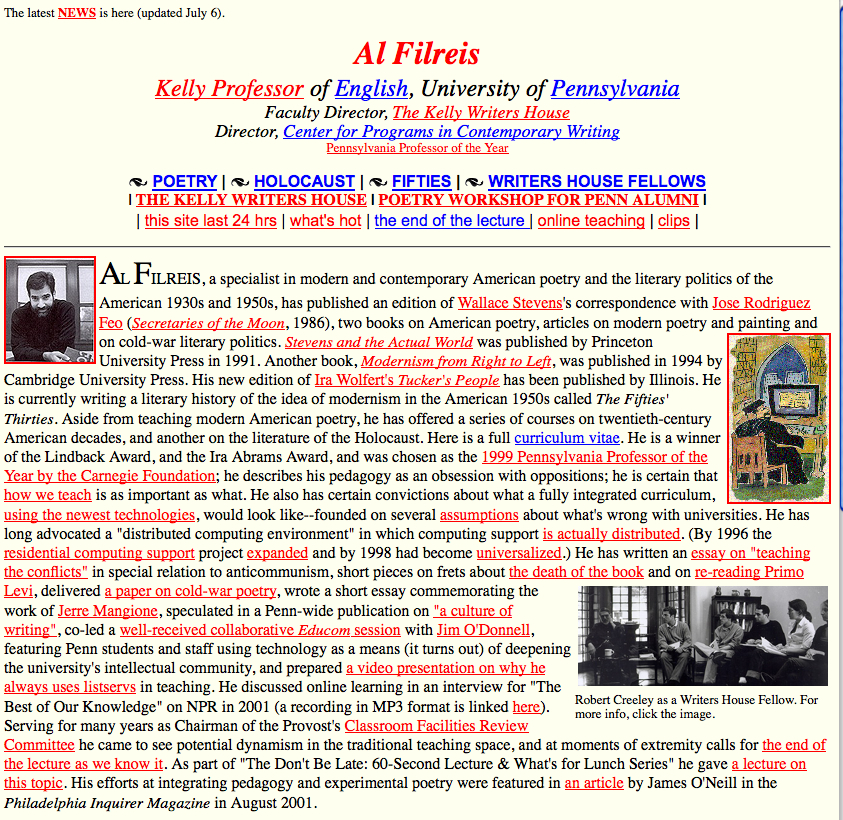
March 6, 2011
More more
February 28, 2008
Your daily Al
September 26, 2007
Courses using PennSound
August 17, 2007
Electronic pedagogy
The 'Philadelphia Inquirer' ran a Sunday magazine story about my poetry course
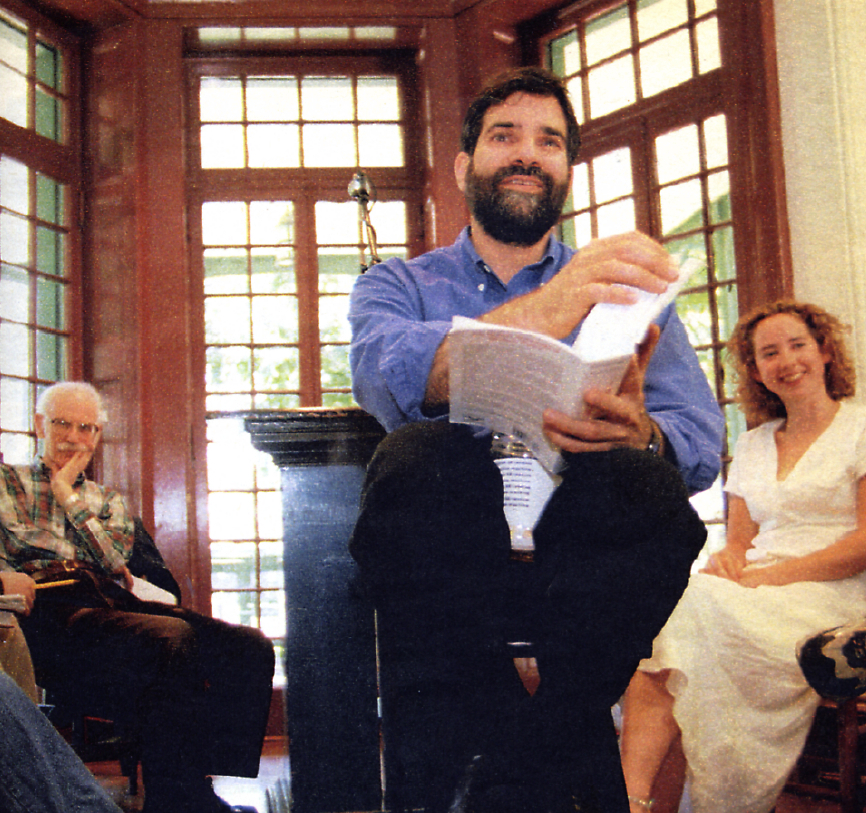
August 17, 2007
The end of the lecture as we know It
August 14, 2007


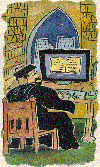 Some anxieties become merely historical. One is surely Barry Sanders’s. His book A is forOx: Violence, Electronic Media, and the Silencing of the Written Word (Pantheon, 1994) is full of worries that the flow of data across the screen is replacing the cozy curl in the armchair — frets about the death of the book. I’m not really much concerned with the problem of making a rejoinder to Sanders, or to Sven Birkerts, whose book The Gutenberg Elegies: The Fate of Reading in an Electronic Age (Faber, 1995) eloquently joins the trend of English profs become anti-computing Jeremiahs. I’m more concerned, actually, with the way in which the logic of Sanders and Birkerts and others affects our thinking about universities at a critical moment when teaching, the intellectual relation of teacher to student, and basic university structures, can dramatically change for the better if we take a few conceptual cues from the information age. The parallels between the two situations — how electronic media alter the book and how they alter education — will have to remain somewhat implicit here, for lack of space. (But, partly to prove my point, I invite discussion of the animated sort these printed pages won’t enable; see below.)
Some anxieties become merely historical. One is surely Barry Sanders’s. His book A is forOx: Violence, Electronic Media, and the Silencing of the Written Word (Pantheon, 1994) is full of worries that the flow of data across the screen is replacing the cozy curl in the armchair — frets about the death of the book. I’m not really much concerned with the problem of making a rejoinder to Sanders, or to Sven Birkerts, whose book The Gutenberg Elegies: The Fate of Reading in an Electronic Age (Faber, 1995) eloquently joins the trend of English profs become anti-computing Jeremiahs. I’m more concerned, actually, with the way in which the logic of Sanders and Birkerts and others affects our thinking about universities at a critical moment when teaching, the intellectual relation of teacher to student, and basic university structures, can dramatically change for the better if we take a few conceptual cues from the information age. The parallels between the two situations — how electronic media alter the book and how they alter education — will have to remain somewhat implicit here, for lack of space. (But, partly to prove my point, I invite discussion of the animated sort these printed pages won’t enable; see below.)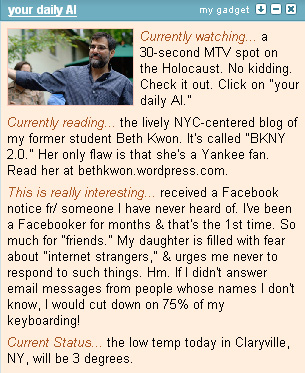 Are you getting enough Al daily? If you're reading this: very possibly yes. On the chance you're not: get
Are you getting enough Al daily? If you're reading this: very possibly yes. On the chance you're not: get 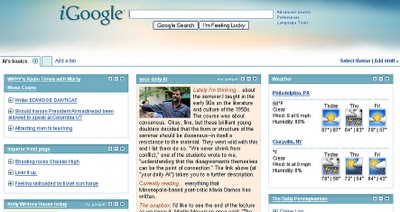 I've created what's called a "gadget" which you can add to your personalized Google page (called "iGoogle"). If you already have a personalized Google page, just click on
I've created what's called a "gadget" which you can add to your personalized Google page (called "iGoogle"). If you already have a personalized Google page, just click on  University of Pennsylvania: PENNsound, writing.upenn.edu/pennsound and Kelly Writers House webcasts. A stellar project at Penn, PENNsound is “committed to producing new audio recordings and preserving existing audio archives.” Here you can listen to readings from 1950s to today and often find great extras and links to other exciting websites.
University of Pennsylvania: PENNsound, writing.upenn.edu/pennsound and Kelly Writers House webcasts. A stellar project at Penn, PENNsound is “committed to producing new audio recordings and preserving existing audio archives.” Here you can listen to readings from 1950s to today and often find great extras and links to other exciting websites.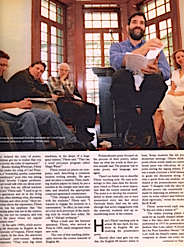 There's no better way to describe Filreis' teaching style. He uses technology to free class time for discussion, which to Filreis is more important than the course material itself. The point is to develop his students' ability to think critically, not to have memorized every last fact about Gertrude Stein. And yet, he said, through that active engagement with the material, students end up remembering more of the content.
There's no better way to describe Filreis' teaching style. He uses technology to free class time for discussion, which to Filreis is more important than the course material itself. The point is to develop his students' ability to think critically, not to have memorized every last fact about Gertrude Stein. And yet, he said, through that active engagement with the material, students end up remembering more of the content.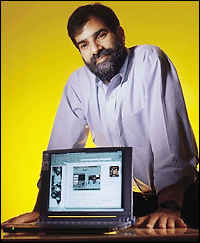 Now that Filreis has broken down the walls of the classroom, he wants to break through all other confines of the university setting. "I want to start recruiting 'teachers' from the extended Penn community," he said, clearly thinking back to Carl Peterson's influence on him at Colgate. "I want more electronic mentoring. I want to deepen the experiment. I'd love to be liberated from the semester so I could teach whomever, wherever, whenever."
Now that Filreis has broken down the walls of the classroom, he wants to break through all other confines of the university setting. "I want to start recruiting 'teachers' from the extended Penn community," he said, clearly thinking back to Carl Peterson's influence on him at Colgate. "I want more electronic mentoring. I want to deepen the experiment. I'd love to be liberated from the semester so I could teach whomever, wherever, whenever."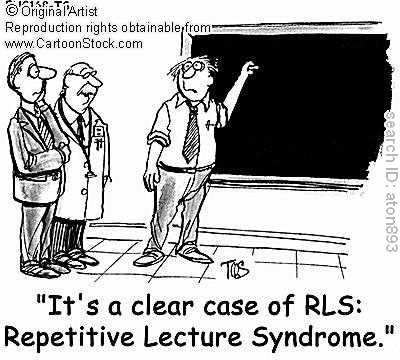 At a conference sponsored by the SEI Center for Advanced Studies in Management on “The Virtual University” (January 12, 1995), Martin Meyerson said:
At a conference sponsored by the SEI Center for Advanced Studies in Management on “The Virtual University” (January 12, 1995), Martin Meyerson said: